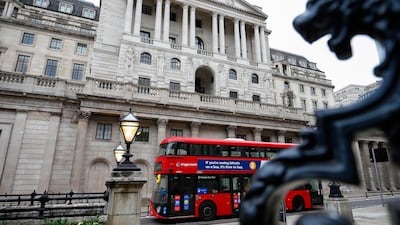The Bank of England maintained the pace of its stimulus on the UK economy and held interest rates at 0.1 per cent on Thursday as it confirmed it does not plan to tighten monetary policy until there is clear evidence of recovery.
The central bank made no change to its target for asset purchases of £895 billion ($1.2 trillion) and the monetary policy committee voted unanimously to hold the benchmark lending rate at a record low of 0.1 per cent, almost a year after the lender first made the interest rate cut.
The lender said it would keep the pace of its government bond purchases at the current level of about £4.4bn a week “with flexibility to slow the pace of purchases later”.
“If the outlook for inflation weakens, the committee stands ready to take whatever additional action is necessary to achieve its remit,” the BoE said.
“The committee does not intend to tighten monetary policy at least until there is clear evidence that significant progress is being made in eliminating spare capacity and achieving the 2 per cent inflation target sustainably."
Britain’s economic outlook is starting to brighten thanks to a rapid inoculation programme under which more than 25 million people have received the first dose of a vaccine.
UK Finance Minister Rishi Sunak's decision to extend furlough payments to those out of work until Covid-19 restrictions end on June 21 is also having a positive economic effect.
However, the BoE said it expects a sharp contraction in output in the first quarter and forecasts that unemployment will peak at 6.5 per cent later in the year, up from the 5.1 per cent in the three months to January.
“The outlook for the economy, and particularly the relative movement in demand and supply during the recovery from the pandemic, remains unusually uncertain,” the BoE said.
Naeem Aslam, markets analyst at Avatrade, said the BoE’s “boring decision” to hold its stimulus package and interest rates steady contrasted with “plenty of action in the equity markets where traders are still digesting the Fed decision”.
The US economy is heading for its strongest growth in about 40 years, the US Federal Reserve said on Wednesday, with the central bank increasing its inflation expectations while indicating there will be no interest rate increase until 2024.
Sterling dipped against the US dollar and the euro following the BoE announcement but failed to “produce any fireworks”, Mr Aslam said.
Meanwhile, British government bond prices rose slightly as investors took the announcement as a sign that the BoE was in no hurry to pare back its stimulus programme.
However, negative interest rates failed to receive a mention in the BoE's report. The central bank first reduced its benchmark interest rate from 0.75 per cent to 0.25 per cent on March 11, before dropping it to 0.10 per cent on March 18 where it remains.
James Lynch, fixed income investment manager at Aegon Asset Management, expects the BoE to retain its dovish stance and “do nothing” over the course of 2021.
“It’s trickier to do nothing. This is what we see the BoE doing in 2021, nothing. There was an expectation in the market of negative bank rates, but the BoE has managed to steer clear of doing that as financial institutions were not operationally ready for it until August 2021,” Mr Lynch said.
“By that point, though, the economy will be in a much better place, so it will not be needed. And the bank already announced the QE buying for 2021 last November.”
European Central Bank chief Christine Lagarde said earlier on Thursday that the lender might need time for its enhanced bond-buying programme to take effect, as the eurozone remains “surrounded by uncertainty”.
The ECB pledged last week to increase the pace of government debt purchases in the coming months to help soothe investor concerns by containing rising bond yields that threaten to derail the region's economic recovery.
Britain has enjoyed a run of positive economic news since the bank's last meeting in February. Output fell 2.9 per cent in January – less sharply than expected – and Mr Sunak's budget statement delivered a fresh dose of fiscal stimulus that coincided with Prime Minister Boris Johnson's plans to lift most lockdown rules by the middle of the year.
However, the BoE said the road ahead remains unclear as vaccination efforts are beset by rows with the European Union over supply and safety issues.
The BoE said the outlook “continues to depend on the evolution of the pandemic, measures taken to protect public health, and how households, businesses and financial markets respond to these developments".


